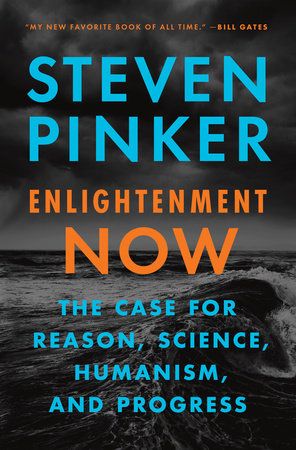Recommended
Steven Pinker's Counter-Counter-Enlightenment
Peter Harrison took exception to his “teleological view of history” and “misplaced faith in data, metrics and statistical analysis.”

A review of Enlightenment Now, by Steven Pinker. Viking (February 2018) 576 pages.

Every so often, something will unite individuals in outrage who disagree furiously about virtually everything else. For the moment, that something is Canadian psychologist Steven Pinker’s latest book, Enlightenment Now: The Case for Reason, Science, Humanism, and Progress. At the New York Times, conservative columnist Ross Douthat decried what he called Pinker’s “smug secular certainties,” and in the London Evening Standard, Melanie McDonagh declared that his “Whiggish case” ignored the “fruits of belief in [God]” and the “old problem of existential angst.” Meanwhile, in the left-leaning New Statesman, surly pessimist John Gray showered extravagant contempt over Pinker’s “evangelism of science” and “ideology of scientism,” and at ABC, Peter Harrison took exception to his “teleological view of history” and “misplaced faith in data, metrics and statistical analysis.”
It is worth noticing that Pinker’s most trenchant critics are eager to flaunt their aversion to the very values Pinker sets out to defend – reason, science, humanism, and progress – and that their critiques display the traits and tics of exactly the kind of counter-Enlightenment thinking he attacks. These counter-Enlightenment trends include Catholic, Romantic, and Postmodern modes of thought which stand – and have always stood – in opposition to the values that Pinker’s book credits with the vast advances humankind has made since the 18th Century.
Douthat’s review, entitled “The Edges of Reason,” claims that Pinker’s attempts to “defend Reason against its enemies . . . absolves his idealized version of the modern project of all imperial and eugenic and centralizing cruelties, and all the genocides and persecutions justified in Reason’s name.” He then offers a somewhat eccentric defence of prayer, ritual, and even alternative medicine, as “individual experimentation”:
Such individual experimentation is not the same thing as the scientific method; it lacks the proving tests of replication and consensus. But the two approaches are more closely related than today’s apostles of scientism often suggest. They proceed from the same intense curiosity, the same desire for understanding through experience — and personalized experimentation can be the only way to be empirical when your subject is the strange nexus of the self.
It’s hard to tell from such a short review if Douthat is just idly spitballing here, or if space constrains him from developing a genuinely thought-provoking line of discussion. In any event, Douthat mischaracterises Pinker’s point, which is simply that reason offers a demonstrably more effective means of understanding the world than revealed wisdom, superstition, or faith-based belief. This does not, of course, preclude the possibility that some may find prayer or wish-thinking therapeutic, and Pinker readily acknowledges the “sense of communal solidarity and mutual support” that religious organisations and secular communities are able to provide.
Criticisms of reason as a value fundamental to human progress are hardly new. In his 2005 book, Counter-Enlightenments, the Canadian political theorist Graeme Garrard argued that scepticism about ‘instrumental’ reason (the rational adoption of means to pursue ends), in particular, united a range of counter-Enlightenment philosophies. These thinkers held that the Enlightenment provided individuals with a conception of instrumental reason that, when misapplied, would result in either anarchic chaos or totalitarianism. Whilst few denounced reason outright (their own theories were the product of this faculty, after all), several influential counter-Enlightenment thinkers saw instrumental and individual reason as threats to the prevailing social order. The 18th Century German philosopher, J. G. Hamann, for example, believed that reason and other such “airy” notions distracted humans from earthly virtues. He urged philosophers to find meaning in what was natural and familiar, admiring ignorance and genius as fundamentally Christian values that were crucial to his notion of “Socratic greatness.”
Some of Hamann’s contemporaries, such as the Irish conservative Edmund Burke and French monarchist Joseph de Maistre, were wary of individual reason, and believed that only the collective wisdom generated over centuries provided a reliable form of trial-and-error. Tradition, they argued, was necessary to prevent individual and radical uses of instrumental reason delivering totalitarianism. French Jesuit priest Augustin Barruel warned against the excessive application of reasoning and philosophy in areas where they did not belong. This he called “philosophism,” which he described as:
…the error of every man who denies the possibility of any mystery beyond the limits of reason, of everyone who, discarding revelation in defence of the pretended rights of reason, Equality and Liberty, seeks to subvert the whole fabric of the Christian religion.
Criticisms like these suggest that several counter-Enlightenment thinkers were indeed opposed to reason itself rather than merely its misapplication, and were afraid of what it might inflame in a general populace better suited to the comforts of superstition and whimsy.

It should be no surprise, then, that many of Pinker’s critics betray a concomitant distrust of science, which manifests as stern objections to what they invariably call “scientism.” Douthat complains about “today’s apostles of scientism” and Gray declares Pinker to be “an evangelist for science – or, to be more exact, an ideology of scientism.” Here, “scientism” is a pejorative used to describe the ideological belief that science can settle all questions of import. This belief, it is feared, will be used to invade, sterilise, and finally displace the humanities and the arts, robbing us of the unique beauty and insight they provide. Peter Harrison, director of the Institute for Advanced Studies in the Humanities at the University of Queensland, suggests that the field of history will one day regard “misplaced faith in data, metrics and statistical analysis as a curse of the twenty-first century.”
This rather paranoid objection is not especially new either. Back in 1959, Pinker reminds us, the scientist and novelist C. P. Snow gave a series of important lectures, subsequently published as The Two Cultures and the Scientific Revolution. Snow postulated that the rise of a culture of science prizing objectivity was causing alarm among a ‘Second Culture’ that prizes subjectivity – literary intellectuals, cultural critics, and essayists. Snow found this alarm unnecessary and counter-productive, and he urged the Second Culture to embrace scientific understanding. In 1962, the literary critic F. R. Leavis wrote a furious response, during the course of which he emptied the same kind of scornful invective over Snow that Gray now empties over Pinker:
After noting Snow’s “utter lack of intellectual distinction and . . . embarrassing vulgarity of style,” Leavis scoffed at a value system in which “‘standard of living’ is the ultimate criterion, its raising an ultimate aim.” As an alternative, he suggested that “in coming to terms with great literature we discover what at bottom we really believe. What for—what ultimately for? What do men live by?—the questions work and tell at what I can only call a religious depth of thought and feeling.”
But Leavis misunderstood, misread, or misrepresented Snow then just as Gray and Harrison misunderstand, misread, or misrepresent Pinker now. Snow’s critics, like those who fret about scientism today, were unable or unwilling to think in anything other than zero-sum terms. Snow, on the other hand, recommended a positive-sum synthesis of science and the humanities that would be mutually enriching:
Snow, of course, never held the lunatic position that power should be transferred to the culture of scientists. On the contrary, he called for a Third Culture, which would combine ideas from science, culture, and history and apply them to enhancing human welfare across the globe. The term was revived in 1991 by the author and literary agent John Brockman, and it is related to the biologist E. O. Wilson’s concept of consilience, the unity of knowledge, which Wilson in turn attributed to (who else?) the thinkers of the Enlightenment.
In the same way, Pinker argues that evidence from a variety of methods can converge to produce fresh understanding in non-scientific fields. Linguistics, he points out, use both philosophy of mind and cognitive science to test new hypotheses and build knowledge. Undeterred, Gray protests that “science cannot underwrite any political project, classical liberal or otherwise, because science cannot dictate human values.” Gray’s apparent belief that this is a decisive refutation of some kind is particularly amusing, because Pinker – repeatedly! – says the same. “Science,” he writes, “is not enough to bring about progress,” and “scientific facts do not by themselves dictate values.”
Nor does Pinker absolve those who use the scientific method in the service of oppression and cruelty. “An endorsement of scientific thinking,” he writes, “must first of all be distinguished from any belief that members of the occupational guild called ‘science’ are particularly wise or noble.” It is humanism, he argues, which “provides the ought that supplements the is.”

Predictably, Pinker’s counter-Enlightenment critics are as unimpressed by the demonstrable merits of secular humanism as they are by those of reason and science. Pinker defines contemporary humanism as a movement with a non-supernatural basis for meaning and ethics, the goal of which is to maximise human flourishing and the wellbeing of other sentient organisms. At NYMag, the conservative Christian Andrew Sullivan chastised Pinker’s “contempt for religion,” and in The Nation, the historian David Bell griped about his “rigid, Richard Dawkins-style atheism.” But Pinker describes humanism as “by no means incompatible with religious institutions” and states “that religions should not be condemned or praised across the board.”
As the historian Darrin McMahon observed in his 2002 book, Enemies of the Enlightenment, a theme common to counter-Enlightenment thinkers (especially those who were Catholic) was the fear that the materialism and secularism of Enlightenment philosophy would diminish the necessity of faith, and that these philosophers were militant atheists determined to dismantle the church and monarchy. Interestingly, McMahon also demonstrates that this pervasive perception of the Enlightenment has been shaped retrospectively by various counter-Enlightenment writers, and suggests it is now “largely ignored” by academic scholars in the field due to its biases. In any case, many of the Enlightenment’s most important thinkers were not atheists, but deists and believers of one sort or another, who nevertheless held that quarrelling religions and their mutually exclusive doctrines and edicts should play no part in determining human ethics or governance.
In a bad-tempered review for the New York Times under the risible title, “Steven Pinker Wants You to Know Humanity Is Doing Fine. Just Don’t Ask About Individual Humans,” Jennifer Szalai denounces Pinker’s “crude utilitarian sentiments” and accuses him of being “sympathetic to humanity in the abstract but impervious to the suffering of actual human beings.” It would surely be impossible to assess human progress by examining the life of every human being, but what does humanity consist of, if not an aggregate network of actual individual human beings? Pinker justifies his use of aggregate data by pointing out that “a quantitative mindset, despite its nerdy aura, is in fact the morally enlightened one, because it treats every human life as having equal value rather than privileging the people who are closest to us or most photogenic.” Szalai’s response is to complain that:
Even if manufacturing jobs have gone to China, “and the world’s poor have gotten richer in part at the expense of the American lower middle class,” he still sees this as cause for celebration: “As citizens of the world considering humanity as a whole, we have to say that the trade-off is worth it.”
Szalai finds Pinker’s arguments, attitude, and even his marshalling of copious data, “disdainful and condescending.” But the painstaking care with which he makes his case for human progress is simply aimed at reducing what is known as the “Optimism Gap,” which occurs when people assume that their own living standards and quality of life are improving but that the standards of society in general are worsening. A ‘Negativity bias’ (“people dread losses more than they look forward to gains…dwell on setbacks more than they savor good fortune…are more stung by criticism than they are heartened by praise”) and the ‘Availability heuristic’ (“people estimate the probability of an event or the frequency of a kind of thing by the ease with which instances come to mind”) combine to produce a media culture that emphasises bad news at the expense of good (“if it bleeds it leads”) and disfigures our understanding of the world as it is.
“Intellectual culture,” Pinker observes, “should strive to counteract our cognitive biases, but all too often it reinforces them.” This, in turn, can have negative consequences on voting behaviour and public trust in institutions. At a time when populist demagogues are riding to power on narratives of despair and decline, it is particularly important that people remain alive to the benefits and the fragility of incremental progress. In a book filled with amazing statistics and factoids, this passage is among the most remarkable:
Thrillingly, the gift of longevity is spreading to all of humankind, including the world’s poorest countries, and at a much faster pace than it did in the rich ones. “Life expectancy in Kenya increased by almost ten years between 2003 and 2013,” Norberg writes. “After having lived, loved and struggled for a whole decade, the average person in Kenya had not lost a single year of their remaining lifetime. Everyone got ten years older, yet death had not come a step closer.” As a result, inequality in life expectancy, which opened up during the Great Escape when a few fortunate countries broke away from the pack, is shrinking as the rest catch up. In 1800, no country in the world had a life expectancy above 40. By 1950, it had grown to around 60 in Europe and the Americas, leaving Africa and Asia far behind. But since then Asia has shot up at twice the European rate, and Africa at one and a half times the rate. An African born today can expect to live as long as a person born in the Americas in 1950 or in Europe in the 1930s. The average would have been longer still were it not for the calamity of AIDS, which caused the terrible trough in the 1990s before antiretroviral drugs started to bring it under control.
As the bearer of these glad tidings, Pinker has received no thanks from his opponents. On the contrary, they appear to resent being asked to acknowledge this news. Harrison accuses Pinker of offering a faith-based “teleological view of history – the idea that historical events are destined to unfold inexorably in a single direction.” Szalai derides his “messianic anticipation” and even David Wootton, in an otherwise positive review for the TLS, raises a sceptical eyebrow at “Pinker’s assumption that progress can be projected indefinitely into the future.”
Unsurprisingly, similar charges of ‘facile optimism’ were also made against the Enlightenment’s philosophers, despite their circumspection about what lay ahead. As Garrard writes, “none believed that progress was inevitable, although most thought that it was likely, even though it would not be easy and could not be taken for granted.” Predictable though such charges may be, they must be irritating for the author of a book, the explicit purpose of which is to make a case against naive complacency in favour of conditional optimism.
The central theme of Enlightenment Now, to which Pinker returns over and over again, is that progress has been – and will continue to be – possible, provided that we combine reason, science, and humanism with our capacity for ingenuity and sympathy and a defence of benign institutions. “The Enlightenment belief in progress,” Pinker cautions at one point, “should not be confused with the 19th Century belief in mystical forces, laws, dialectics, struggles, unfoldings, destinies, ages of man, and evolutionary forces that propel mankind ever upward toward utopia.”
But many of Pinker’s critics are not simply objecting to the details of progress, they are hostile to the idea that progress has occurred at all. While this may be partly due to the Optimism Gap, the Negativity bias, and the Availability heuristic, there are hints that it may reflect a deeper anxiety – that progress, especially recent progress, directly undermines a belief on the radical Left and Right that worsening human conditions and societal decline demand institutional overhaul, insurrection, and revolutionary change.
Not only is the idea of progress repulsive to eco-pessimists who believe humans are despoiling the planet and plunging the world into irredeemable chaos, it is also anathema to anarchists and populists who would rather see the state burn to the ground than support incremental reform, and to ethnonationalists who believe liberal cosmopolitanism has brought Western civilisation to the verge of collapse. There are those who claim that the threats posed by radicalism and populism from the Left and the Right are exaggerated. But the middle ground between catastrophising and complacency feels particularly narrow at the moment, and it is necessary to identify threats early, if they are to be effectively resisted.
On this count, Pinker has come prepared. The reason he is always one step ahead of his critics is that the counter-Enlightenment arguments they rehearse are as old as the Enlightenment itself. The difference is that now the evidence is in. There are those who have grumbled that Enlightenment Now isn’t really about the Enlightenment at all, and in a sense they are right. This is not a work of philosophy but a work of social science. Those expending time and keystrokes angrily complaining that Pinker’s version of the Enlightenment does not accord with their preferred definition are missing the point. Pinker’s book is not a case for the Enlightenment that invites refutation, but a refutation of the arguments of the counter-Enlightenment which, it turns out, have been wrong all along.






